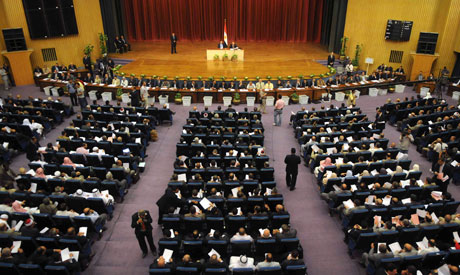
File photo: A general view of the two chambers of parliament meeting to elect the 100 members of the constituent assembly in Cairo June 12, 2012. (Photo: Reuters)
Egypt's Supreme Administrative Court has declared null and void the right recently granted to military police to arrest civilians, said lawyer and former presidential candidate Khaled Ali.Ali, who filed the appeal against the law, confirmed to Ahram Online from the courtroom on Tuesday that the court had ruled in his favour.
Egypt’s justice ministry issued a decree on 13 June granting military personnel the right to arrest civilians, a right previously reserved for police officers.
Crimes to which the law could be applied included "crimes and misdemeanours harmful to the government," "possession/use of explosives," "resisting orders issued by those in power or assaulting them," "destruction of public property or historic monuments," "obstructing traffic," "strike-actions at institutions that serve the public interest or assaulting the right to work," and "intimidation and thuggery.”
Earlier on Tuesday, the Supreme Administrative Court delayed its rulings on four controversial cases: one on the dissolution of the lower house of parliament, delayed to 9 July (initially postponed to 7 July but head of State Council Ali Fekri rescheduled the session); the second on the constitutionality of the constituent assembly, delayed to 4 September (initially delayed to 1 September but judge Fekri also rescheduled the session) ; the third on the constitutionality of the Shura Council (the upper, consultative house of Egypt’s parliament), delayed to 10 July; and the fourth on the controversial addendum to last year’s Constitutional Declaration, delayed to 10 July.
Egypt’s High Constitutional Court (HCC) ruled on 14 June that Egypt's parliamentary election law – which regulated last year's legislative polls – was unconstitutional. Following the decision, Egypt's ruling Supreme Council of the Armed Forces (SCAF) ordered the dissolution of the People’s Assembly (the lower house of Egypt’s parliament), a move which is now being challenged in court. The court ruling also threw the legitimacy of Egypt's controversy-dogged constituent assembly, tasked with drafting a new constitution, into doubt.
What’s more, the SCAF last week issued an 'addendum' to last year's Constitutional Declaration (issued in the wake of last year's revolution) giving it the power to dissolve the constituent assembly tasked with drafting a new constitution if the assembly “encounters obstacles that prevent it from completing its work” (Article 60B) and draw up a new assembly in its place.
The Muslim Brotherhood, whose Freedom and Justice Party represents the largest party in parliament and whose candidate, Mohamed Morsi, won just-concluded presidential elections, has stated unofficially that it would not accept the ruling junta's constitutional addendum or the dissolution of parliament's lower house.
According to several leading Brotherhood members, Morsi will refuse to take the oath of office before the HCC – as is stipulated by the constitutional addendum – because to do so would amount to tacit recognition of the addendum and the HCC decision that led to the People's Assembly's dissolution.
Other Brotherhood members, however, have said they would accept the court verdicts.
Such contradictory statements suggest that negotiations remain ongoing between the Brotherhood and the military council over the future of Egypt's parliament.
Prominent reform campaigner Mohamed ElBaradei, for his part, has said he was mediating between the two parties with the aim of "avoiding escalation."
Short link: